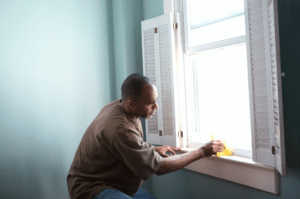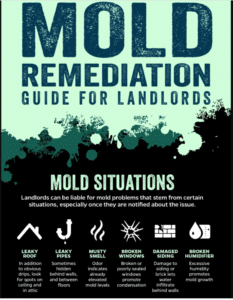 Are you seeing mold in your rental house or apartment in Washington DC ? You might be surprised as to what Washington DC requires and doesn’t require landlords to do when mold rears its head in a rental property.
Are you seeing mold in your rental house or apartment in Washington DC ? You might be surprised as to what Washington DC requires and doesn’t require landlords to do when mold rears its head in a rental property.
The dealings between a landlord and tenant can be trying enough with the typical maintenance of a rental property; add the evidence of mold to the mix, and you’ve got a rental situation nobody envies. On top of creating health complications for tenants, mold can bring about costly repair bills for the dwelling.
A lot of Americans rent their living space. More than a third of U.S. residents were renters in 2017, according to Governing.com.
With this high number of people renting, the issue of mold and landlord responsibilities is bound to come up. Knowing your responsibilities as a tenant or landlord can be helpful and possibly ward off a lot of uneasy conversations.
How To Prevent Mold in Rental Houses & Apartments in Washington DC
Preventing Mold From Infesting Your Rental Property
What kind of mold remediation company would we be if we didn’t show you how to check for mold in your rental property?
Mold infestation is a result of an uncontrolled moisture problem, whether from a wet carpet pad that never dried completely or a leak in the roof that allowed water to pool in your ceiling and bring on the microfungi growth.

American Apartment Owners Association made a helpful graphic about best practices for cleaning up mold in a rental unit at https://www.american-apartment-owners-association.org/wp-content/uploads/2016/10/mold-v3.jpg.
For landlords: Prepping the tenant and making sure he or she knows the signs of mold growth is paramount so that mold can be reported to the landlord as soon as possible.
For landlords and tenants: Mold can appear as quickly as 48 hours after water damage happens, and it’s even more of a risk if it’s in a hard-to-spot area (e.g. a leaky pipe under the kitchen sink). Know when you should test for mold in the air.
Getting your insurance company to cover for mold remediation isn’t always as simple as you might think. Read up on the circumstances regarding homeowners insurance and mold claims.
Mold in Rental House Washington DC: What the Feds Require
Let’s look at Washington DC versus the federal government.
Legal liability for mold remediation, at the federal level, is nonexistent. The U.S. Environment Protection Agency (EPA) holds no standards or regulations for mold.
Mold in Rental Units: What DC Requires
Tenants must notify the landlord or property owner in writing about mold issues, according to the Department of Energy & Environment (DOEE) of Washington DC. Once the first contact has been made, the landlord or owner has seven days to respond and 30 days to fix the problem. For mold problems that span more than 10 square feet, a licensed mold remediation professional must inspect and fix the microfungi infestation, the DOEE mandates.
If the landlord fails to respond after the seven-day window, DOEE provides contact information for filing a claim. The DOEE has posted its list of DOEE-licensed mold professionals, two of which are Moldgone’s own Joe and Jon.
See Washington DC’s mold removal guidelines here.
Disclaimer: MoldGone is not the authority on Washington DC laws. We have provided resources that we believe would help landlords and tenants; the reader, however, should consult their local government and/or a local attorney.
What Type Of Mold Do You Have In Your DC Rental House?
Think you’ve spotted mold in your Washington DC rental property? Figure out what kind of mold you’re likely dealing with, and if it’s something you can clean up yourself.
MoldGone Can Help You Get Rid Of Mold In Rental House In Washington DC
If you would like an internationally accredited, customer-focused mold remediation team to inspect or treat a mold problem in your rental unit, schedule an appointment today!
